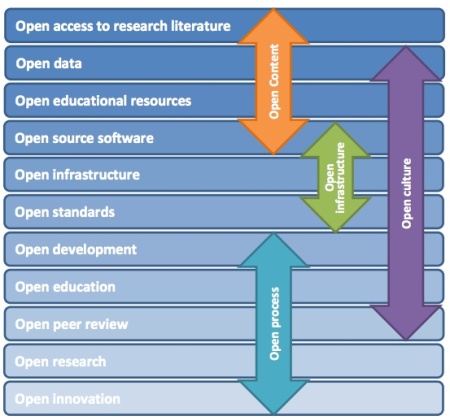Last week I went to the Open and Flexible Higher Education Conference in Paris where I presented two Cetis papers on the Open Scotland initiative and technology challenges from the Jisc / HEA UKOER Programmes. Both papers were well received and there was considerable interest in Open Scotland from colleagues from Norway. The papers are available to download form Slideshare here:
Technology Challenges from the UKOER Programmes by Phil Barker and Lorna M. Campbell
Open Scotland by Lorna M. Campbell, Phil Barker, Sheila MacNeill and Joe Wilson
This is the first time I’ve attuned the EADTU Conference, with its focus on distance education provision in the HE sector, it’s a slightly different community from the one Cetis usually engages with. However there were many well known faces there and it was good to see such a large contingent from the Open University UK present. Unfortunately I wasn’t able to arrive in time to hear the opening keynote presentations however the papers I heard in the parallel sessions were excellent and the closing keynotes on the first day were suitably thought provoking. Inevitably MOOCs were a prevalent theme but I was encouraged that there was still a lot of discussion about other forms of open education practice and open education resources. It was also good to see Li and Stephen’s MOOCs and Open Education Cetis whitepaper quoted by one of the delegates from Lisbon. Here’s a few of the highlights.
Variable cost minimisation business models in higher education
– Yoram Kalman, Open University of Israel
This excellent talk presented a coherent analysis of the nature and characteristics of business models and exploded many of the myths surrounding the ability, or not, of MOOCs to disrupt HE business models. Yoram’s presentation raised so many relevant issues that I’ll try and write a blog post summarising his main points.
Sketching the user interface of digital textbooks applied to formal learning environments
– Luis Fernandes, Universidade Nova de Lisboa
Unfortunately Luis himself was unable to be present but his paper was ably presented by his colleague Andreia Teles Vieira who demonstrated Luis etexbook implementation based on HTML5, EPub3 and CSS3. The implementation included book marks, annotation, and discussion groups, the ability to share via social media, rearrange and reorganise book content and compare different versions of books. Cetis have recently been discussing the potential of ePub3 and its ability to interoperate with other specification such as QTI, so I hope we can find out more about Luis work.
Do MOOCs announce a new paradigm for higher education?
– John Daniel and Stamenka Uvalic-Trumbic
Daniel suggested that while MOOCs are not a new paradigm for education, they may usher in other new paradigms and are accelerating three trends in HE:
• Shorter courses
• New types of awards such as open badges.
• Accelerate the move to online learning.
In response to these trends universities must develop new policies, execute online courses well and pay attention to quality. Uvalic-Trumbic developed the theme of quality and suggested that new courses and forms of assessment and accreditation need new forms of quality assurance, adding that open badges don’t take quality into account. I’m not sufficiently up to speed with open badges to know if this is actually true, so I’d be interested to hear other’s thoughts on the matter.
While I agreed with some of the points raised by this presentation I strongly disagreed with Sir John Daniel’s assertion that “Most MOOCs are OER with added assessment.” As I see it, most MOOCs have little to do with openness and even less to do with OER!
Foresights on Open Education 2030
– Yves Punie, Institute or Prospective Technological Studies, Seville
Yves presented the outputs of Imagining Open Education 2030 initiative, which called for vision papers covering three sectors; school education, higher education and lifelong learning. The vision papers and outputs of this exercise can be found here: http://blogs.ec.europa.eu/openeducation2030/
The following key tensions were distilled from vision papers and scenarios.
- At the core of open education 2023 are unbundling, abundance, networking, flexibility and personalised learning
- Learning services will not necessarily be free, under an open licence and accessible to all.
- HE institutions will not disappear but need to redefine their role in the open education landscape – existing funding and quality mechanisms are not sustainable.
Yves also highlighted the SURF Policy paper e-InfraNet: ‘Open’ as the default modus operandi for research and higher education which can be downloaded here: http://www.surf.nl/en/publicaties/Pages/e-InfranetOpenreport.aspx
I haven’t had a chance to look at this paper but it does include this diagram illustrating the range of “opens”.
OpenupEd as a European answer on MOOCs: a student centred approach
– Fred Mulder, OUNL and UNESCO
Fred introduced the EU Opening Up Education initiative, which appears to be gearing up to become a direct competitor to US MOOC providers such as Coursera and Udacity. Opening up education is a subtle change from open education and shows that this is a process; there is no fixed model for education over time, there will always be diversity.
The term open is used widely but is not well defined. OER is one of the few terms that is well defined. The Hewlett Foundation defines OER as:
“OER are teaching, learning, and research resources that reside in the public domain or have been released under an intellectual property license that permits their free use and re-purposing by others. Open educational resources include full courses, course materials, modules, textbooks, streaming videos, tests, software, and any other tools, materials, or techniques used to support access to knowledge.”
But OER is not open education, there are five components of open education:
Supply side components
1. Open educational resources
2. Open learning services
3. Open teaching efforts
Demand side components
4. Open to learners needs
5. Open to employability and capabilities development
Opening Up Education is a globally linked and decentralised model that will provide a distinctive quality brand with high visibility and marketing potential. Participants will be able to engage with partners’ experience and expertise in developing MOOCs and evaluating and monitoring them from an institutional perspective. In addition partners will also have the opportunity to join cross-national projects with external funding. I also got the impression that there is, or will be an Opening Up Education platform, but that’s something I need to look into in more detail.


